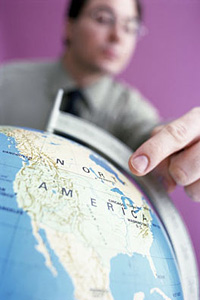 |
 |
 |
 Business News | June 2007 Business News | June 2007  
'Go Global' is Great Advice
 Alan Caplan - edmontonsun.com Alan Caplan - edmontonsun.com
go to original


| | Canada is still one of the highest taxed jurisdictions in the world and tax planning is a necessary adjunct to investment planning |
For a couple of years now, investment professionals have urged investors to "be mobile, go global." In other words, diversify outside of Canada.

Until now, that's been good advice. Ours is almost exclusively a resource and financial services based equity market.

TWO SECTORS RULE

Sure there are some good technology stocks and a few other types listed on the TSX too, but that market, our largest equity bourse, almost entirely rises and falls on the backs of those two sectors. Despite what we'd like to think, we're still, in the main, hewers of wood and drawers of oil and water.

Mix in high demand for resources, especially oil, with a rising Canadian dollar - almost 50% in less than three years against the Greenback, bringing us almost to par - and you have a Canadian surge in returns that's been hard to beat by investing in companies that reside in the rest of the world.

But that self-same dramatic rise in the Canadian dollar is changing the dynamics that surround it.

I was in Mexico a week ago and watched the U.S./Canadian exchange difference by monitoring the Mexican peso against both currencies.

The difference between the pesos bought by a loonie versus the number for the U.S. dollar almost exactly mirrored our exchange rate versus the U.S. dollar.

When I checked last Thursday there was only about a 7/10ths of a peso difference - the same as the U.S./Canadian rate.

That means buying Mexican goods is now almost 50% cheaper for Canadians than it was only three or four years ago and relatively more expensive for Americans, although not nearly to the same extent. I suspect the evidence would show the same thing against most other currencies around the world.

So buying your investments offshore today is buying them with much more powerful Canadian dollars.

The travel media is chock-a-block with how it's so much cheaper for Canadians to travel abroad now. It's the same for investing.

Only, once you've finished your trip, you've been there and done that, but you get to keep your investments until long after the photos fade.

There's another difference. While the loonie is more powerful now, that won't always be the case.

Eventually, global warming or some other event will take its toll on our resource revenues and the value of the Canadian dollar will slip. Economics never stands still.

DIVERSITY CAN BE GOOD

When that happens, prices of foreign investments will increase, resulting in higher returns. So it can be a good thing for a diversified portfolio.

My recent anecdotal survey of Canadian equity mutual fund managers shows most increased their foreign content to as much as 50% over the past few years. The reasons are obvious from what I've detailed above.

Here are a couple of rules of thumb: First, foreign distributions of dividends are taxed higher than their Canadian counterparts, so increase your foreign content initially in your RRSP where tax isn't an issue until they come out.

Next, if you're investing outside an RRSP, it's probably better to use a tax-class or corporate mutual fund (versus a mutual fund trust or even a foreign stock). Such funds are managed with a view to eliminating the tax consequences of those distributions by increasing the cost base of their shares, thus substantially or entirely eliminating their distributions.

We're still one of the highest taxed jurisdictions in the world and tax planning is a necessary adjunct to investment planning.

So today, going global isn't just good advice, it's great advice. | 
 | |
 |



